How huskies are transforming lives through therapy in Yorkshire and beyond
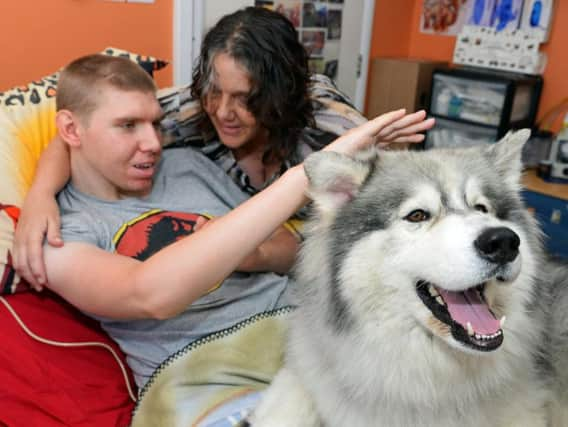

“Goodbye Thunder dog,” Ben Fyfield calls out, as a wooly Siberian Husky leaves his home in Barnsley after their hour-long therapy session.
For five months, Thunder has been visiting the 27-year-old, who has a rare form of epilepsy as well as other complex medical issues - and not only is the pair’s heartwarming bond clear to see, the sessions are also making a difference to Ben’s physical and mental wellbeing.
Advertisement
Hide AdAdvertisement
Hide Ad“Ben doesn’t use his left arm, it’s very rare,” his mum Liz Baldwin explains. “Through stroking and hugging, he’s actually using his left arm, which is a lot. It’s taking him a lot of core strength to sit up and use it.
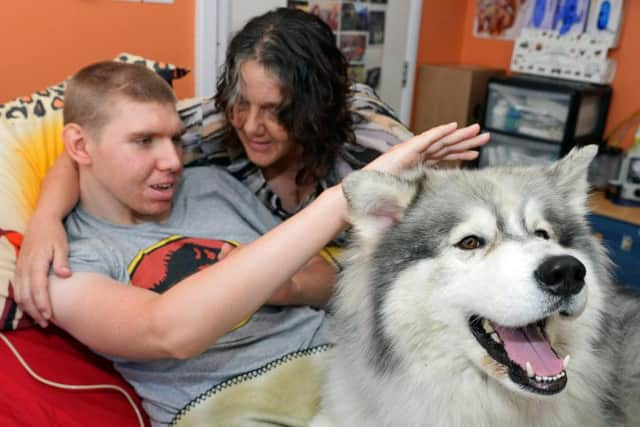

Therapy dog Betty’s “remarkable” effect on dementia sufferers at York Hospital“The two of them are building an absolutely fabulous bond and we’re hoping eventually Thunder will run in and jump straight on Ben’s bed and we can just leave them to it.
“A dog can sense when you’re having a bad day or can sense something different about you that us humans can’t. It’s helping Ben’s wellbeing and giving him something that he looks forward to, that he loves and enjoys.”
Thunder started monthly visits to Ben earlier this year after Liz came across a leaflet for Therapy Huskies. Run by Adrian Ashworth, with his partner Claire, it is made up of their four Siberian Huskies, who are specially trained to help people with autism, mental health issues, dementia and other complex needs and disabilities, as well as with those at the end of their lives or dealing with bereavement.
Advertisement
Hide AdAdvertisement
Hide AdHow huskies are “touching the hearts” of dementia sufferers“We are always trying new things for Ben,” Liz says, “so I wondered if [Therapy Huskies] might be able to come and do a visit with him. He has his bad days and he can’t tell you. I can read his face, but he can’t tell you. But Ben loves animals so I thought we’ll give it a go and we’ll know in the first five minutes.
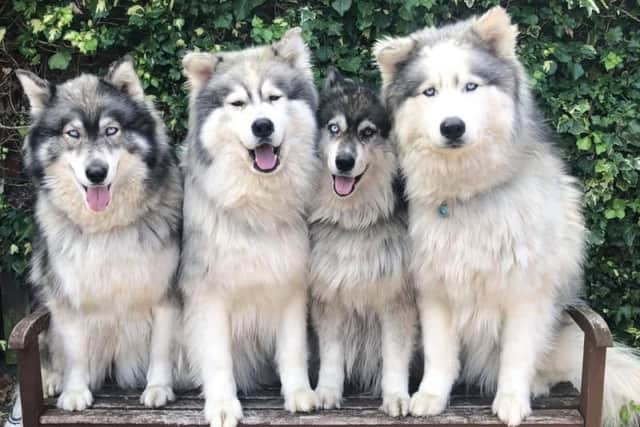

"When Thunder came, he had a massive smile on his face, absolutely massive. To Ben, he’s Thunder dog and he wants to have him there all the time in his bedroom.”
Ben has Dravet syndrome, a rare and severely disabling type of epilepsy, as well as scoliosis - a sideways curvature of the spine, and cerebral palsy. He is tube fed, uses a wheelchair and is very weak on the left side of his body and is cared for by Liz and a team of personal care assistants.
The impact of his regular interaction with Thunder has been so transformative, that the therapy dog has now been built into Ben’s continuing care plan.
Advertisement
Hide AdAdvertisement
Hide Ad“By stroking the dog, he’s using his left arm in a physio way without even realising it,” says Sarah Cadman, who has been caring for Ben for more than two years. “He’s started using his left arm a lot more generally. It’s also relaxation for him as well. You can feel the calm atmosphere when Thunder’s here, how calm it is and how good it is for Ben’s wellbeing.”
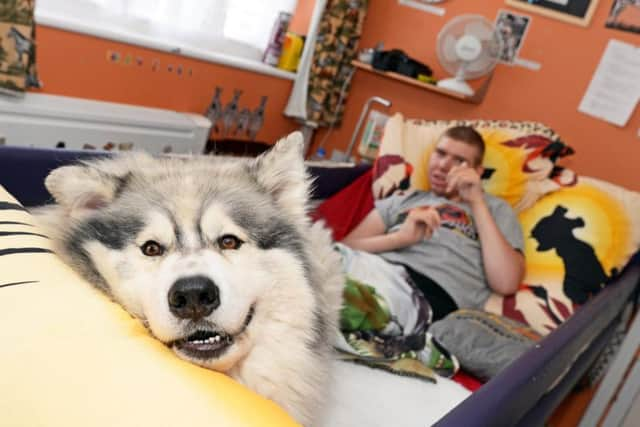

“It’s mainly his mood where I can see a difference,” adds fellow carer Callum Jones. “When they first met, he was so excited about it. After his first session, when I came on shift, he was so happy. Before I even got through the door, I noticed he was beaming from ear to ear. He couldn’t wait to tell us. It really has cheered him up.”
Meet Digby - born and bred in Yorkshire, he’s the UK’s first guide horse in trainingBen’s bad days can see him bed-bound or spending time in hospital, but when he is well, he looks after two Shetland ponies at Greenworks Barnsley - a farm offering opportunities to people with learning disabilities, goes bowling with friends and plays music at a community group.
“Like any mum, you want to do your best for your child,” says Liz. “It’s hard with somebody with complex needs but just because their body might not work as well doesn’t mean they can’t participate and enjoy things - it’s just finding those things. With Ben and Thunder, it’s about the connection between them and the smile on Ben’s face. That’s a million dollars.”
Advertisement
Hide AdAdvertisement
Hide Ad“You do your best no matter what for your child to give them the best quality of life whatever that entails and you try new things,” she adds. “Would Ben have been able to use his left arm like he is now? Probably not - and what Thunder has brought is amazing. I’m very proud to have him as part of Ben’s team.”
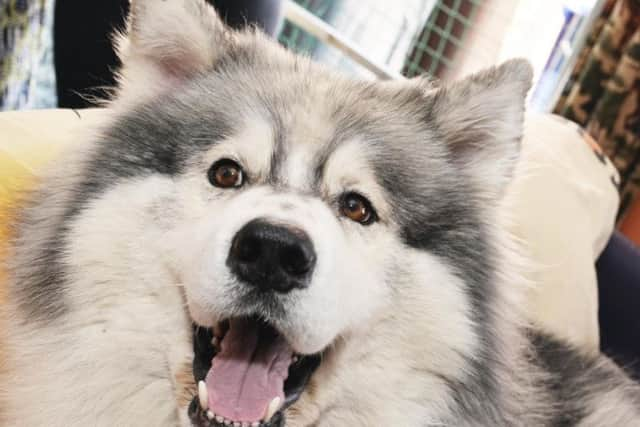

The change in Ben has moved Adrian close to tears - and not for the first time. In the two years that Therapy Huskies has been running, the interaction between the dogs and those they support has left him misty-eyed time and again.
On one occasion, Thunder, who specialises in end of life work and in supporting people with mental illness, laid on the floor beside a man in his final minutes, reaching up to put his paws on the side of the man’s bed and lick his face just seconds before he passed away. “There wasn’t a dry eye in the room,” Adrian says. “I absolutely love seeing them make a difference.
“They’re the equivalent of what could be my kids and I am so proud of what they do. Over the last two years, we’ve helped thousands of people.”
Advertisement
Hide AdAdvertisement
Hide AdThough the organisation is based at Adrian’s home in Barnsley, the dogs work all over the UK, frequently visiting care homes and community groups as well as individuals in their homes on a private basis.
The oldest, Stormy, nine, focuses on young people and has frequented children’s cancer wards. Like her son, Thunder, her other pups also have specialist roles. Thor works with people who struggle to communicate including those with autism and Down’s Syndrome and Binny Boo’s attention is on bereavement, though she also helps those in fear of dogs.
All four also look after people with dementia and it is in this area that they were first trained by Adrian.
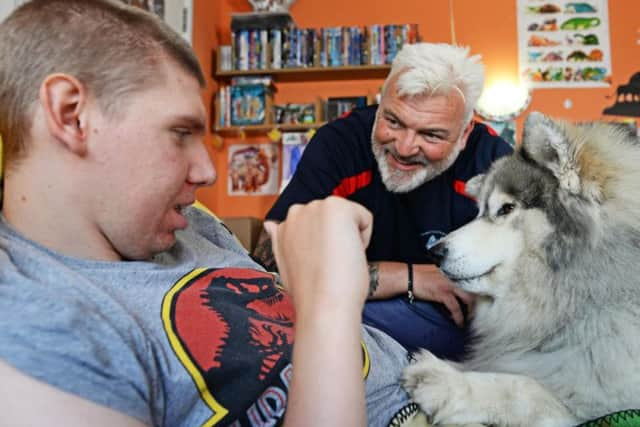

A photographer by trade, who has owned huskies for more than 20 years, he has enjoyed training dogs since being a child. But, though he delivered and slept with his youngest three dogs after having Stormy bred five years ago, it wasn’t until two years later that he had the idea to train all of them in dementia care.
Advertisement
Hide AdAdvertisement
Hide AdHe was moved to start using the dogs in this way after seeing how Thunder, in particular, responded to his father, Alan, when he was in the early days of experiencing dementia.
“At this time, Thunder started walking in the room and climbing up dad’s leg and trying to lick his head...Fast -forward six months and all the dogs were doing stuff to my dad. They all started teaming up and acting differently around him.”
Later realising the dogs had used their intuition to sense something was wrong, Adrian began training Thunder first, and then the others, to react with calm and comfort around people with dementia, with the help of a couple he met at a support group with his father.
Within a year, he founded what he originally called Dementia Dogs, and with further training in other areas, followed by a name change for the organisation, things progressed from there.
Advertisement
Hide AdAdvertisement
Hide Ad“We absolutely love it. It’s all about smiles and happiness. That’s what we want people to be - happy and that’s what the dogs’ purpose is. Special dogs, for special people. It’s very, very simple. We just want people to smile.”
Adrian and Claire juggle the running of Therapy Huskies - and the busy task of caring for their four dogs - around their jobs.
The organisation is run on funds from the people they visit but they also do several trips for free to try to ensure their services are available to anyone who needs them.
Adrian says they have had to use their own savings to cover the cost of this, as well as public funding and donations.
Advertisement
Hide AdAdvertisement
Hide Ad“It got to the stage the month before last when we had to turn a few people down and it’s the last thing I’ve ever wanted to do,” he says. “We want to be there for everyone in their hour of need.”
For more information about the dogs and the services on offer, visit www.therapyhuskies.co.uk